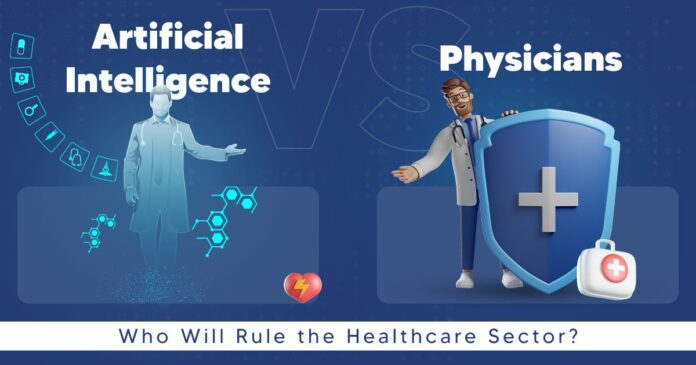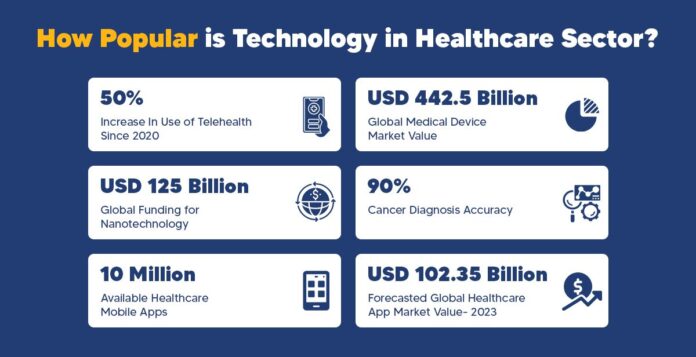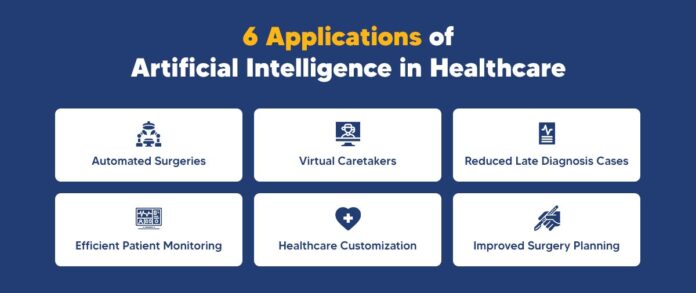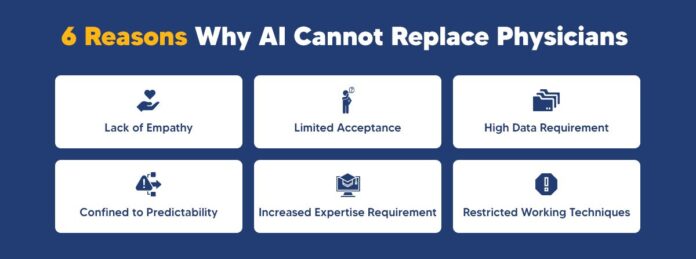Artificial Intelligence is one of the most powerful tech innovations that has taken businesses from numerous industries by storm. Owing to the advanced nature and immense potential of AI technology, tech experts are looking for ways to maximize its implementation and make it a more vital part of human life. With an incredible market value of USD 93.5 billion, AI is one of the most promising and high-potential technologies, among many others.
At present artificial intelligence and its solutions are utilized in various aspects of our everyday life. One of the most significant implementations out of all is evident in the healthcare sector. The potential of AI in healthcare has reached a level where people are comparing this smart technology to the expertise of physicians.
However, does technology really holds significant potential in the healthcare sector? The short answer to this question is yes. Over the course of recent years, technology has secured an irreplaceable position in the healthcare sector. Let’s start this blog by understanding the growing role of technology in the healthcare sector.
Scope of Technology in Healthcare Services
The term ‘healthcare technology’ is not new. In fact, in the past decades, technology and healthcare have developed parallel to each other and have become an integral part of human life. The scope and potential of healthcare technology have only increased in the past years. Today, the healthcare sector is benefitting from numerous new and old technologies and is becoming ‘tech-smart’.
Owing to this vast scope of technology in the healthcare sector, physicians and healthcare institutions are now able to enhance the quality of their services and make healthcare more efficient, economical, and accessible for the common people. This has majorly contributed to improving the standard of living and has significantly boosted human life expectancy.
One of the most popular healthcare technologies is artificial intelligence. Based on big data and machine learning, AI is truly a smart technology that has the capability to self-evolve and innovate itself over the course of time. Owing to these aspects of AI technology, many people are comparing AI’s capabilities to that of a physician.
However, is it possible to substitute the services of a physician with that of technology? Let’s find the answer to this question by comparing the two in the upcoming section.
Artificial Intelligence vs Physicians
As medical science has evolved over the years, the quality of physicians’ healthcare services has also enhanced. Today, physicians use numerous modern techniques, approaches, drugs, treatments as well as technologies to treat their patients. One such technology is artificial intelligence.
AI, with its smart capabilities, has proven to ease the work of doctors and, in many cases, has even acted as a more accessible and practical replacement for their services. Today, numerous healthcare institutions are using AI-based solutions in their practices to deliver optimum quality healthcare services to their patients.
From the primary diagnosis stage to determining treatment possibilities, and in many cases, even conducting treatments, AI has acted as an all-rounded solution for the healthcare sector. As a result, many patients are now considering AI as an optimal replacement for physicians.
You must be wondering, what are the different implementations and uses of artificial intelligence in the healthcare sector, right? Keep on reading to get the answer to this question.
6 Ways in Which AI Can Replace Physicians
Automated Surgeries
Automation of surgeries is a highly futuristic approach to healthcare. These types of surgeries are highly precise, efficient, and fast. In case you do not know about this concept, a robot replaces a surgeon’s role and automatically performs the surgery and surgical procedures.
These robots are empowered by artificial intelligence and are highly advanced and capable of performing the most complex of surgeries. AI facilitates process automation, which is fundamental to robotic surgery and makes it easy for surgeons to perform surgeries. As a result, these surgeries are much safer than the traditional ones and largely reduce the chances of complications and risks for the patients.
Virtual Caretakers
Caregiving and nursing are an integral part of healthcare services. Healthcare institutions and physicians are well-aware of this fact and emphasize on providing quality nursing to patients. However, it can be challenging for a healthcare institution to provide continuous and consistent support.
This is where the role of artificial intelligence technology comes into the scenario. Patients can use AI-based nursing solutions to get optimum care for their healthcare conditions. This caretaker AI solution can regulate drug doses, diagnose patients’ health, and be a highly efficient nursing partner for patients.
This eliminates the need to hire nurses for the patients and increases the overall quality of the healthcare services, and makes them efficient and more accessible.
Reduced Late Diagnosis Cases
Late diagnosis is one of the leading causes of the high mortality rate in many diseases. In simple terms, a late diagnosis is a case where physicians or patients are unable to identify the early signs of a disease, which can lead to its further growth and spread.
A late diagnosis can result in a life-threatening condition for the patients, especially in serious cases like those of cancer. To explain, undiagnosed cancer can metastasize to other locations and become a life hazard. As a result, it is important for patients as well as physicians to get a timely diagnosis of the health concern for its optimal treatment.
Artificial intelligence facilitates this need and is a highly useful form of digital technology to avoid late diagnosis. To explain, AI uses machine learning to learn from a pool of medical data and provide a reliable primary medical prognosis. This prognosis is useful in avoiding late or delayed diagnosis and in catching diseases in their early stage.
Efficient Patient Monitoring
Monitoring a patient’s health is essential for the physician to provide quality healthcare services. Moreover, certain medical treatments, procedures, and even diagnoses are based on how well or bad the patient’s past health has been. However, this precise and close monitoring is easier said than done.
To explain, there is a large number of healthcare service seekers in the world. It is practically impossible for doctors to monitor each and every patient and manage their records. This is where the role of AI technology comes into the scenario.
AI can be efficiently integrated with other high-end technologies like IoT healthcare wearables to monitor a patient’s health. While the wearable’s sensors are the ones in action to record the patient’s vitals, AI, using its machine learning capabilities, determines whether or not these signs are deemed ‘normal’ or not. The big data and machine learning aspects of AI enable physicians to track their patient’s health and allow patients to maintain their health and avoid complications.
Healthcare Customization
Healthcare services are highly individual and vary from one person to another. No two cases are the same for physicians, and therefore, so aren’t their treatments. As a result, every patient requires individual attention for their different concerns, which can be challenging, keeping in mind the increasing global demand for healthcare services.
However, artificial intelligence is highly capable of meeting this requirement and is an excellent technology for providing customized and individualistic treatments to patients. With AI technology, it is possible to provide a custom treatment plan based on the patient’s symptoms and concerns.
In simple terms, AI, when integrated with big data, can learn about different healthcare concerns and their respective treatments. Based upon this learning, it not only provides a diagnosis but also a highly customized treatment for the patients. This way, AI is a billion-dollar idea to make healthcare more accessible to a wider audience.
Improved Surgery Planning
Planning a surgery can be a complex task for even the most experienced surgeons. This is especially the case in critical surgeries that can pose a potential threat to the patient’s life. However, AI has made surgery planning easier and more efficient and has made it possible for surgeons to assess the outcomes and risks and plan the overall procedure.
When integrated with other technologies like 3D printing, AI can provide a hyperrealistic view of the patient’s anatomy and can give surgeons a closer look at what they have to work on.
Moreover, AI can also help determine other aspects of the surgery, such as potential hazards, risks, success rate, etc., making it a highly useful technology for the surgery aspect of medical science.
These were a few of the most popular implementations of AI in the healthcare sector. However, it is worth noting that it is not possible to rely on AI completely for healthcare services. Being a technology, AI also holds certain drawbacks that limit its implementation in the healthcare sector. The upcoming section will cover these limitations in detail.
6 Limitations of AI in the Healthcare Sector
Lack of Empathy
Empathy and comfort are highly essential parts of healthcare-related services. In certain cases, offering empathy is as important as providing optimal treatment to the patients. This is especially the case in certain branches of medical science like Psychiatry, Oncology, Pediatrics, etc.
The services of physicians in these branches are not only confined to providing a diagnosis and treatment but also extend to comforting the patients and reassuring them about their health. However, it is commonly known that empathy is a human emotion that machines and technology cannot replicate.
As a result, while AI has the potential to do wonders in the healthcare sector in terms of diagnosis and treatment, its application does not extend to providing empathic support to patients. Moreover, certain patients simply do not accept the support from machines and reject it altogether, therefore limiting the scope of AI in the healthcare sector.
Limited Acceptance
While AI holds tremendous potential in the healthcare sector, it has a limited scope of implementation to this day. This is mainly because of the limited acceptance and lack of trust among the patients for the technology. To explain, the patients trust the expertise and qualifications of a physician and do not see AI and its auxiliary technologies as an optimal replacement for a physician’s services.
In the end, it is the patients that determine whose services they prefer, a doctor or a technology. Therefore, despite having the potential to replace physicians, AI’s scope is limited to consumer acceptance.
However, with changing times, people are trusting technology more and more. Therefore, while the scope of AI-based healthcare services might seem to be limited at the present time, there is hope for future growth with the increasing acceptance of technology.
High Data Requirement
For AI technology to work efficiently, one needs to feed it with a tremendous amount of data. The technology is based on machine learning and feeds on data to learn decision-making. As a result, AI is useful for healthcare institutions and physicians only if they have a plethora of data to feed to the technology.
However, most healthcare institutions are unable to do this, as they either do not have the required data or have it in quantities that are not enough for AI to learn optimally. As a result, the scope of artificial intelligence in the healthcare sector is limited to data availability.
Confined to Predictability
One of the major limitations of AI technology is that its interpretations are limited predictability. However, it is commonly known that the healthcare sector does not operate upon predictability. With new healthcare concerns and complications coming up, it is challenging for a physician or technology to treat patients based on a limited number of predictable concerns and treatments.
Moreover, in certain cases, AI is unable to predict the right course of action for the patients, which can lead to wrong diagnosis and treatment. As a result, it is highly risky to rely on AI for quality healthcare services, as the technology can hinder the overall health of the patient in complex and unpredictable cases. This highly limits the use and acceptance of AI technology in the healthcare sector.
Increased Expertise Requirement
It is commonly known that AI single-handedly cannot manage patients and their cases, and at some point, human interference is essential. Moreover, despite being highly smart, AI needs a human to operate it. As a result, while AI can be used to enhance the overall quality of healthcare services, it will still need a physician to operate and work with it.
However, most of the time, physicians are not tech-savvy and are often unaware of how to work AI and integrate it into their practice. Therefore, integrating AI requires providing additional training to physicians, nurses, and other staff members, and in some cases, even patients, for its efficient utilization.
In many cases, the cost of providing this training can turn out to be unviable for healthcare institutions as well as practitioners and can make it unfeasible to implement AI in healthcare.
Restricted Working Techniques
Healthcare professionals work in a non-linear pattern and have a dynamic working technique. Physicians understand that each case is different and use their years of training, skills, and expertise to curate a treatment plan that will best fit the patient’s needs.
However, it is not possible to achieve this objective with AI technology. While AI is useful for handling simple and less-complicated cases, it is incapable of handling complex cases that require a dynamic treatment.
This is usually the case with severe health conditions and serious concerns. In such cases, physicians conduct regular examinations and tests and modify the treatment plan to fit the patient’s current state of health. As a result, it is not possible to completely replace physicians with AI in every aspect of healthcare services.
This was it for the downsides and limitations of implementing AI-based solutions in the healthcare sector. Therefore, you must be wondering whether or not AI can replace physicians in the healthcare sector, right? Let’s take a look at this question from a different angle in the upcoming section.
Shifting from ‘AI vs. Doctors’ to ‘AI and Doctors’ Approach
You would have realized by now that implementing AI technology in the healthcare sector comes with its own pros and cons. While there are numerous advantages of implementing artificial intelligence and its solutions into medical practice, the limitations of this technology are significant and cannot be overlooked.
As a result, at present, it is impossible for AI to replace physicians. However, considering the latest advancements in healthcare, it is fair to say that the healthcare sector cannot operate manually and needs certain external support through high-end technologies and artificial intelligence. Therefore, instead of replacing one with another, it is in the best interest of physicians as well as technology to work in harmony and alignment with each other.
By accepting and integrating AI-based solutions, healthcare institutions and professionals are certain to increase the efficiency of their medical practices and provide top-notch quality healthcare services to patients.
This concept of integrating AI-based solutions with medical practices is not new and is being widely implemented by physicians all across the globe. In the upcoming section, we will take a closer look at the top AI-based technologies that support the healthcare sector.
Top AI-based Healthcare Technologies
Wearables
Healthcare wearables are one of the trendiest forms of technology all across the globe. These wearables are empowered by the Internet of Things technology and are useful not only for patients but in general, for everyone looking for high-end healthcare.
These IoT wearables are often integrated with AI technology to boost their efficiency. To explain, physicians recommend patients to use their wearables to keep track of their vitals like pulse rate, heartbeat, O2 saturations, etc.
When integrated with AI, these IoT wearables are capable of alarming patients in case their vitals aren’t right and can also help them to manage and avoid emergencies. Moreover, these wearables also enable physicians to track patients’ vitals over a time period. This data enables them to lay down the most efficient course of treatment for them.
Mobile Apps
Mobile applications are one of the most popular forms of healthcare technology. They are easily accessible, user-friendly, and are an excellent medium for patients to avail healthcare services.
One of the most popular implementations of this technology is evident through doctor appointment booking apps, which hold the majority of share among healthcare apps. AI has a significant role in improving the quality of these applications.
To explain, healthcare institutions invest in developing doctor appointment booking applications for their patients and integrate these apps with high-end AI technology to enable patients to get a primary diagnosis for their health concerns. These apps are fed with a large amount of data and enable patients to rule out potential causes for their concerns.
Moreover, certain applications also enable patients to get treatment possibilities for the diagnosed concerns, making healthcare more accessible and efficient.
Surgery Robots
Operation rooms are known for their high-stress environment, as surgical procedures require high alertness and precision. As a result, conducting surgery can be a highly stressful task for surgeons. However, this is no longer the case as modern-day surgeries are conducted through robots and machines.
Moreover, it is commonly known that some surgeries can go on for a prolonged period of time. Here, using surgical robots can not only improve accuracy but also make the lives of surgeons easier. In the earlier section, we discussed how AI facilitates the automation of surgery and surgical procedures through the use of robots. These robot-assisted surgeries are a futuristic approach to medicine and are gaining tremendous popularity.
These surgery robots provide a better view of the surgical field, therefore increasing precision. These robot-assisted surgeries are integrated with artificial intelligence to automate the procedure and deliver high-end results.
Based on big data and empowered with complex algorithms, AI is capable of determining the exact roadmap of the procedure. Some of the most noteworthy adoptions of these surgery robots are visible in oncologic, gynecologic, urologic, and cardiothoracic surgery, among many others. As a result, these AI-powered surgery robots are modern-day surgeons and are a vital part of surgical procedures.
The Bottom Line
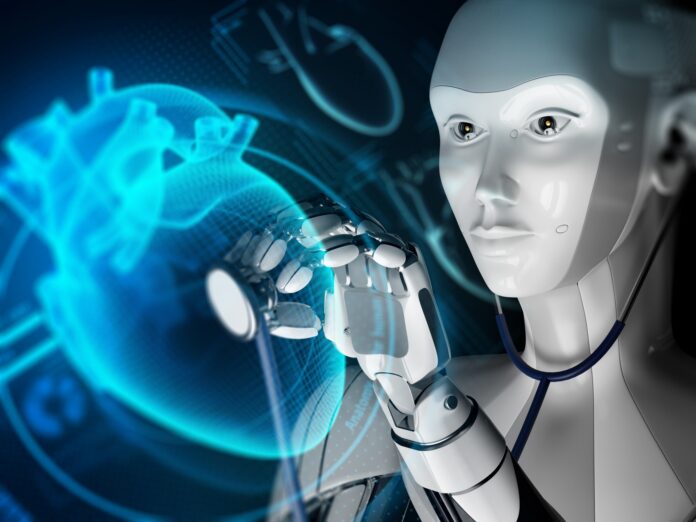
Artificial intelligence is a highly smart and advanced form of digital technology. Today, AI is used in numerous aspects of our everyday life and is a vital part of many industries. One of the most popular implementations of AI technology is visible in the healthcare sector.
Owing to its tremendous potential, AI has the capability to transform the healthcare sector for good. Today, AI has applications in every aspect of healthcare services, from medical prognosis to actual diagnosis and treatment. As a result, many people are considering AI as an optimal replacement for physicians.
However, the scope of this technology is limited in certain aspects, due to which it is impossible for it to replace physicians anytime soon.
On the other hand, by implementing AI-based solutions and integrating them with their practice, physicians are certain to enhance the quality of their services and make healthcare more efficient and accessible for patients
